Italian sex siren Rossana Podestà (1934-2013) played in many European films of the 1950s and 1960s. She is best known as the stunningly beautiful leading lady of the international spectacle Helen of Troy (1956).

German postcard by ISV, Sort. 17/6.
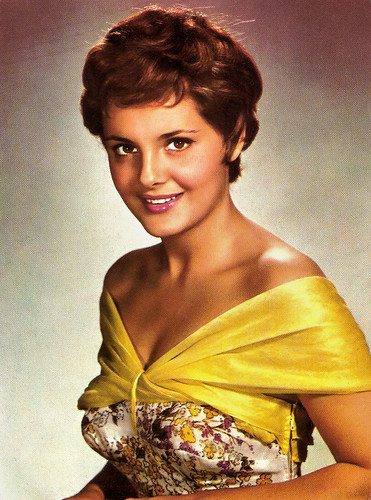
French postcard by Editions P.I., Paris, no. 1001. Photo: Sam Levin.

French postcard by Editions du Globe, Paris, no. 38. Photo: Sam Lévin.

Italian postcard by IFPA, no. 9. Rossana Podestà in La red/Rosanna (Emilio Fernández, 1953).

German postcard by ISV, no. D 10. Photo: Boslo. Publicity still for Helen of Troy (Robert Wise, 1956).

Collector's card. Photo: Universal International. Publicity still for Raw Wind in Eden (Richard Wilson, 1958).
Rossana Podestà was born Carla Dora Podestà in Zliten near Tripoli in the then Italian colony of Libya, in 1934 (according to AllMovie, 1938). She was the daughter of Italian-Argentine parents.
Her family moved to Rome after World War II. Rosanna began her film career at the age of 16 when a talent scout spotted her for the film Strano appuntamento/Strange Encounter (Dezsö Ákos Hamza, 1950) with Leda Gloria.
She appeared in romantic neorealist films like Domani è un altro giorno/Tomorrow is Another Day (Lèonide Moguy, 1951) starring Pier Angeli, Guardie e Ladri/Cops and Robbers (Steno, Mario Monicelli, 1951), the Mexican production La Red/Rosanna (Emilio Fernandez, 1954), and the first film of director Valerio Zurlini, Le ragazze di San Frediano/The Girl from San Frediano (1954).
These films, especially La Red made her a popular pin-up, and she posed for many magazine covers of the 1950s and 1960s. On the screen she appeared as Nausicaa in the sword-and-sandal spectacle Ulisse/Ulysses (Mario Camerini, 1955) with Kirk Douglas, Silvana Mangano, and Anthony Quinn.
And after considering such established stars as Lana Turner, Elizabeth Taylor, Rhonda Fleming, Ava Gardner and Yvonne De Carlo for the lead in Helen of Troy/Elena di Troia (1956), director Robert Wise chose Podestà, by then an established actress but one who was relatively unknown outside of Italy. She could not speak English so she learned her lines by rote with a voice coach. The film, which also featured a young Brigitte Bardot, gave Podestà international importance.

Vintage postcard by Soberanas (Sobe), no. 495. Rossana Podestà in La red/Rosanna (Emilio Fernández, 1953).

Italian postcard by Bromofoto. Milano, no. 638. Photo: Dear Film. Rossana Podestà in La red/Rosanna (Emilio Fernández, 1953).
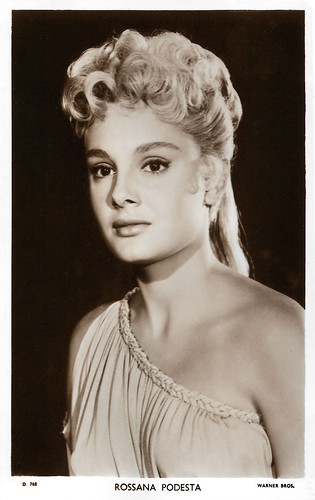
British postcard in The Picturegoer Series, London, no. D 768. Photo: Warner Bros. Rossana Podestà in Helen of Troy (Robert Wise, 1956).

Dutch postcard by Editions P.I., no. 662. Publicity still for Helen of Troy (1956).

Italian postcard by Bromostampa, Milano, no. 233. Rossana Podestà in Helen of Troy (Robert Wise, 1956).

Spanish postcard by Édicion Archivo Bermejo, no. 6576, 1960. Photo: Warner Bros. Rossana Podestà in Helen of Troy (Robert Wise, 1956).
During the 1960s and 1970s, Rossana Podestà metamorphosed into ‘the vamp next door’. She appeared in more ‘Imperial’ films, including La schiava di Roma/Slave of Rome (Sergio Grieco, Franco Prosperi, 1960) with Guy Madison, La freccia d'oro/The Golden Arrow (Antonio Margheriti, 1962) with Tab Hunter, and Sodoma e Gomorra/Sodom and Gomorrah (Robert Aldrich, 1962) with Stewart Granger and Pier Angeli.
It gave her the nickname 'the Queen of the Peplum'. Rosanna married director/producer Marco Vicario, and played a ‘femme fatale’ in his films Le ore nude/The Naked Hours (Marco Vicario, 1964) based on a story by Alberto Moravia, the caper film Sette uomini d'oro/Seven Golden Men (Marco Vicario, 1965), and the sequel Il grande colpo dei sette uomini d'oro/Seven Golden Men Strike Again (Marco Vicario, 1966) with Philippe Leroy.
To her regret her then-husband dubbed her voice in Le ore nude and so 'excluded her from the Silver Ribbons', the awards of the Italian National Syndicate of Film Journalists.
Later Rossana Podestà appeared in some erotic comedies like Il prete sposato/The Married Priest (Marco Vicario, 1973) and Paolo il caldo/The Sensual Man (Marco Vicario, 1973) opposite Giancarlo Giannini. She also posed nude for Playboy magazine.
She also played in a few Hollywood films, but she never gained the popularity in the States that she had in Europe. In 1979 she was one of the judges in the Miss Universe pageant. The next year she played a part in the comedy anthology I seduttori della domenica/Sunday Lovers (Dino Risi, 1980) and appeared in the neo-peplum Ercole/Hercules (Luigi Cozzi, 1983) starring TV-Hulk Lou Ferrigno.
She ended her film career with Giuseppe Bertolucci’s award-winning Segreti segreti/Secrets Secrets in 1985. Rossana Podestà retired and chose to live her life quietly in Dubino (in the Sondrio province) and in Rome, with mountaineer, explorer, and journalist Walter Bonatti.
Rossana Podestà passed away in 2013 in Rome at the age of 79.

German postcard by Kunst und Bild, no. S 576. Photo: Europa Filmverleih. Publicity still for Le ragazze di San Frediano/The Girls of San Frediano (Valerio Zurlini, 1954).
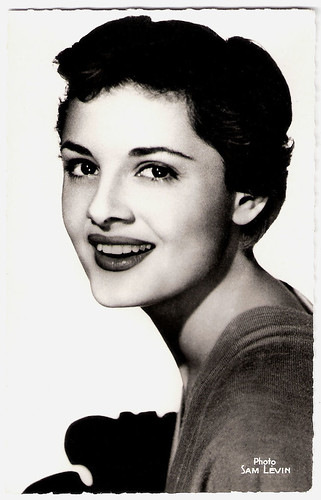
French postcard by Editions du Globe, no. 367. Photo: Sam Lévin.

French postcard by Editions du Globe, no. 606. Photo: Sam Lévin.

French postcard by Editions P.I., no. 497. Photo: Sam Lévin.

Italian postcard by Bromofoto, Milano, no. 935. Photo: Warner Bros. Rossana Podestà in Helen of Troy (Robert Wise, 1956).

Italian postcard by Bromofoto, Milano, no. 1168. Photo: Warner Bros.
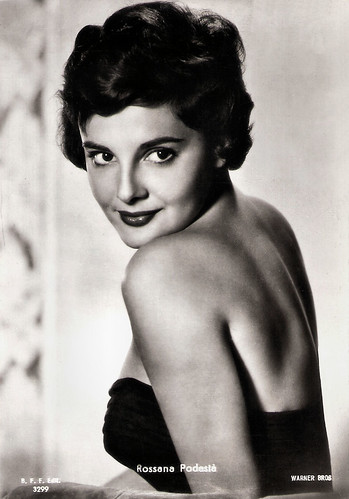
Italian postcard by B.F.F. Edit. (Casa Editr. Ballerini & Fratini, Firenze), no. 3299. Photo: Warner Bros.
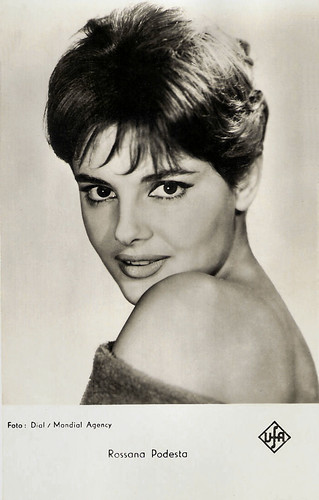
French postcard by Editions P.I., Paris, no. FK 4650. Photo: Dial / Mondial Agency / UFA.

Romanian postcard by Casa Filmului Acin, no. 92. Rossana Podestà in 7 uomini d'oro/Seven Golden Men (Marco Vicario, 1965).
Sources: Sandra Brennan (AllMovie), Wikipedia (English and Italian), and IMDb.
This post was last updated on 21 May 2020.

German postcard by ISV, Sort. 17/6.

French postcard by Editions P.I., Paris, no. 1001. Photo: Sam Levin.

French postcard by Editions du Globe, Paris, no. 38. Photo: Sam Lévin.

Italian postcard by IFPA, no. 9. Rossana Podestà in La red/Rosanna (Emilio Fernández, 1953).

German postcard by ISV, no. D 10. Photo: Boslo. Publicity still for Helen of Troy (Robert Wise, 1956).

Collector's card. Photo: Universal International. Publicity still for Raw Wind in Eden (Richard Wilson, 1958).
Romantic Realism
Rossana Podestà was born Carla Dora Podestà in Zliten near Tripoli in the then Italian colony of Libya, in 1934 (according to AllMovie, 1938). She was the daughter of Italian-Argentine parents.
Her family moved to Rome after World War II. Rosanna began her film career at the age of 16 when a talent scout spotted her for the film Strano appuntamento/Strange Encounter (Dezsö Ákos Hamza, 1950) with Leda Gloria.
She appeared in romantic neorealist films like Domani è un altro giorno/Tomorrow is Another Day (Lèonide Moguy, 1951) starring Pier Angeli, Guardie e Ladri/Cops and Robbers (Steno, Mario Monicelli, 1951), the Mexican production La Red/Rosanna (Emilio Fernandez, 1954), and the first film of director Valerio Zurlini, Le ragazze di San Frediano/The Girl from San Frediano (1954).
These films, especially La Red made her a popular pin-up, and she posed for many magazine covers of the 1950s and 1960s. On the screen she appeared as Nausicaa in the sword-and-sandal spectacle Ulisse/Ulysses (Mario Camerini, 1955) with Kirk Douglas, Silvana Mangano, and Anthony Quinn.
And after considering such established stars as Lana Turner, Elizabeth Taylor, Rhonda Fleming, Ava Gardner and Yvonne De Carlo for the lead in Helen of Troy/Elena di Troia (1956), director Robert Wise chose Podestà, by then an established actress but one who was relatively unknown outside of Italy. She could not speak English so she learned her lines by rote with a voice coach. The film, which also featured a young Brigitte Bardot, gave Podestà international importance.

Vintage postcard by Soberanas (Sobe), no. 495. Rossana Podestà in La red/Rosanna (Emilio Fernández, 1953).

Italian postcard by Bromofoto. Milano, no. 638. Photo: Dear Film. Rossana Podestà in La red/Rosanna (Emilio Fernández, 1953).

British postcard in The Picturegoer Series, London, no. D 768. Photo: Warner Bros. Rossana Podestà in Helen of Troy (Robert Wise, 1956).

Dutch postcard by Editions P.I., no. 662. Publicity still for Helen of Troy (1956).

Italian postcard by Bromostampa, Milano, no. 233. Rossana Podestà in Helen of Troy (Robert Wise, 1956).

Spanish postcard by Édicion Archivo Bermejo, no. 6576, 1960. Photo: Warner Bros. Rossana Podestà in Helen of Troy (Robert Wise, 1956).
The Vamp Next Door
During the 1960s and 1970s, Rossana Podestà metamorphosed into ‘the vamp next door’. She appeared in more ‘Imperial’ films, including La schiava di Roma/Slave of Rome (Sergio Grieco, Franco Prosperi, 1960) with Guy Madison, La freccia d'oro/The Golden Arrow (Antonio Margheriti, 1962) with Tab Hunter, and Sodoma e Gomorra/Sodom and Gomorrah (Robert Aldrich, 1962) with Stewart Granger and Pier Angeli.
It gave her the nickname 'the Queen of the Peplum'. Rosanna married director/producer Marco Vicario, and played a ‘femme fatale’ in his films Le ore nude/The Naked Hours (Marco Vicario, 1964) based on a story by Alberto Moravia, the caper film Sette uomini d'oro/Seven Golden Men (Marco Vicario, 1965), and the sequel Il grande colpo dei sette uomini d'oro/Seven Golden Men Strike Again (Marco Vicario, 1966) with Philippe Leroy.
To her regret her then-husband dubbed her voice in Le ore nude and so 'excluded her from the Silver Ribbons', the awards of the Italian National Syndicate of Film Journalists.
Later Rossana Podestà appeared in some erotic comedies like Il prete sposato/The Married Priest (Marco Vicario, 1973) and Paolo il caldo/The Sensual Man (Marco Vicario, 1973) opposite Giancarlo Giannini. She also posed nude for Playboy magazine.
She also played in a few Hollywood films, but she never gained the popularity in the States that she had in Europe. In 1979 she was one of the judges in the Miss Universe pageant. The next year she played a part in the comedy anthology I seduttori della domenica/Sunday Lovers (Dino Risi, 1980) and appeared in the neo-peplum Ercole/Hercules (Luigi Cozzi, 1983) starring TV-Hulk Lou Ferrigno.
She ended her film career with Giuseppe Bertolucci’s award-winning Segreti segreti/Secrets Secrets in 1985. Rossana Podestà retired and chose to live her life quietly in Dubino (in the Sondrio province) and in Rome, with mountaineer, explorer, and journalist Walter Bonatti.
Rossana Podestà passed away in 2013 in Rome at the age of 79.

German postcard by Kunst und Bild, no. S 576. Photo: Europa Filmverleih. Publicity still for Le ragazze di San Frediano/The Girls of San Frediano (Valerio Zurlini, 1954).

French postcard by Editions du Globe, no. 367. Photo: Sam Lévin.

French postcard by Editions du Globe, no. 606. Photo: Sam Lévin.

French postcard by Editions P.I., no. 497. Photo: Sam Lévin.

Italian postcard by Bromofoto, Milano, no. 935. Photo: Warner Bros. Rossana Podestà in Helen of Troy (Robert Wise, 1956).

Italian postcard by Bromofoto, Milano, no. 1168. Photo: Warner Bros.

Italian postcard by B.F.F. Edit. (Casa Editr. Ballerini & Fratini, Firenze), no. 3299. Photo: Warner Bros.

French postcard by Editions P.I., Paris, no. FK 4650. Photo: Dial / Mondial Agency / UFA.

Romanian postcard by Casa Filmului Acin, no. 92. Rossana Podestà in 7 uomini d'oro/Seven Golden Men (Marco Vicario, 1965).
Sources: Sandra Brennan (AllMovie), Wikipedia (English and Italian), and IMDb.
This post was last updated on 21 May 2020.
1 comment:
Maravilhosa Rossana!
O Falcão Maltês
Post a Comment